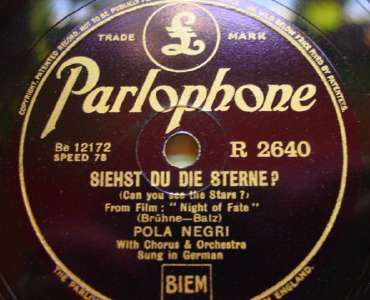
POLA NEGRI DISCOGRAPHY
Pola Sings! (An Intro to Pola's Singing and Recording Career)
by David Gasten
 |
The label of Side B of the Parlophone (UK) version of Pola's lfinal single, “Zeig der Welt nicht dein Herz” b/w “Siehst du die Sterne?” Both tracks are from the film Die Nacht der Entscheidung (1938). |
Much of the information here courtesy Jerzy Placzkiewicz, from the article "Pola Negri Sings!", published in the book Legenda Kina: Pola Negri: A Cinema Legend (Muzeum Kinematografii w Lodzi, 2008; p. 68-72).
Pola Negri's recording career ran concurrent with the International Period of her filmography. Pola had previously been instructed in music while a student at the Imperial Theatre of Warsaw. In 1931 she performed on stage in a London production called The Last Tango, where she sang gypsy songs in Russian. These performances were tremendously successful, and led Victor to record her singing gypsy songs with guitar accompaniment from Boris Golovka and two others with a chorus of gypsy singers. The songs were recorded over the course of a two-day session in March of 1931, and three singles were released from these sessions.
The next year, 1932, cemented Pola's career as a singer when she performed the song "Paradise" in the RKO film A Woman Commands (1932). Although the film itself fared poorly, Pola's sexy performance of this slightly risqué song became a runaway hit in the sheet music format, which led to a successful vaudeville tour starring Pola and featuring the track as its program highlight. The song was recorded by Russ Columbo (with whom she would strike up a brief affair), would be featured in other movie and, later on television scores (most notably Adventures in Paradise), and would be recorded by many more artists and be a minor standard for many years. Despite the track's overwhelming popularity, the original English-language version was neer released on record, although a French-language version was recorded and released as a single in France the following year in 1933.
With the success of "Paradise", Pola's European directors began consistently utilizing her talents as a singer in her movies. Pola sang three songs cast as a cabaret singer in her only French movie Fanatisme (1934), but, as with "Paradise", none were released on record. She sang agin in her German success Mazurka (1935), here playing the role of both a theater primadonna and a cabaret singer. This time her songs were released as a single on the Odéon label and then re-recorded the next year in English-language versions, which were released on the Parlophone label. Her songs from Moskau-Shanghai (1936), Tango Notturno (1937), and Die Nacht der Entsheidung (1938) would also be released on record on Odéon in Germany and on Parlophone in the UK.
Although the single featuring her songs from Die Nacht der Entsheidung would be her last single, her career as a singer and her characterization as one in the movies would continue after this when she returned to America. She was cast as an operatic soprano in Hi Diddle Diddle (1943) (although her singing voice was dubbed in). After this, she performed for a time as a singer on the supper club curcuit, singing a repertoire that centered around and included "Paradise", before retiring from the entertainment business altogether.
Listed below are all ten singles released by Pola, plus a mention of one known unreleased thack (it is not currently known if it survives). The released tracks from the singles have all been collected together on CD along with the only recorded single by Rudolph Valentino on a now out-of-print French compilation entitled Pola Negri/Rudolph Valentino: 1923-1938 (1999).
Discography
Title |
Single No. |
Matrix No. |
Label |
Recording Date/Place |
|---|---|---|---|---|
“Ve Chantasni” (“The Hour of Longing”) b/w “Sto nam gore?” (“Why Are You Sorry?”) |
HMV EK-114 |
OB-641/ |
His Master's Voice |
Small Queen's Hall, London, March 12, 1931. |
“Os sho tass” |
unreleased |
OB-643 |
His Master's Voice |
Small Queen's Hall, London, March 12, 1931. |
“Why Fall in Love?” b/w “Two Guitars” (aka "Gyspy, Sing!") |
HMV EK-115 |
OB-648/ |
His Master's Voice |
Small Queen's Hall, London, March 13, 1931. |
“Ochye Tchornia” (“Dark Eyes”) b/w “Adieu” (“Farewell, My Gypsy Camp”) |
HMV B-3820 |
OB-647/ |
His Master's Voice |
Small Queen's Hall, London, March 13, 1931. |
Pola’s gypsy recordings recorded in the wake of her success in the London theatre production The Last Tango. Pola sings with guitar accompaniment from Boris Golovka and two others with a chorus of gypsy singers. The song “Two Guitars” (aka "Gyspy, Sing!") was noted on the record as “dedicated to Pola Negri by Boris Golovka.” |
||||
“Paradis” b/w “Mes Nuits sont Mortes” |
AP 989 |
P 76524/ |
Ultraphone |
Paris, July 1933. |
“Paradis” is a French-language version of “Paradise”, Pola’s hit song from A Woman Commands (1932). The English-language version of “Paradise” itself was never released on record, although it does appear in the film’s soundtrack itself and had sheet music released for it. |
||||
“Je sans en moi” b/w “Nur eine Stunde” |
0-4723 |
P Be 10937-3/ |
Odéon |
Berlin, April 8, 1935. |
Songs from the film Mazurka (1935); orchestra arranged by Peter Kreuder. |
||||
“Stay Close to Me” b/w “For That One Hour” |
R 2271 |
128397/ |
Parlophone |
Berlin, c. early 1936 |
“Stay Close to Me” and “For That One Hour” are English-language versions of the Mazurka soundtrack songs “Je sans en moi” and “Nur eine Stunde” respectively. |
||||
“Vergis deine Sehnsucht” b/w “Wenn die Sonne hinter den Dachem Versinkt” |
0-4736 |
P Be 11241/ |
Odéon |
Berlin, March 17, 1936. |
Orchestra arranged by W. Schmidt-Boelcke. |
||||
“Mein Herz hat Heimweh...” b/w “Ich Mochte Einmal nur mien ganzes Herz Verschwenden” |
0-4742 |
P Be 11432-2/ |
Odéon |
Berlin, September 2, 1936. |
“Mein Herz hat Heimweh...” is from the film Moskau-Shanghai (1936). Orchestra arranged by Hans-Otto Borgmann on both tracks. |
||||
“Ich hab an Dich Gedacht” b/w “Kommt das Gluck nicht Heut? Dann kommt es Morgen” |
0-4765 |
P Be 11891/ |
Odéon |
Berlin, December 15, 1937. |
Songs from the film Tango Notturno (1937). Orchestra arranged by Hans-Otto Borgmann. |
||||
“Zeig der Welt nicht dein Herz” b/w “Siehst du die Sterne?” |
0 288233 |
P Be 12171/ |
Odéon |
Berlin, December 30, 1938. |
Songs from the film Die Nacht der Entscheidung (1938). Orchestra arranged by Lothar Bruhne. |
||||

